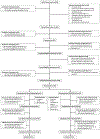A randomized trial of an online, coach-assisted self-management PTSD intervention tailored for women veterans
- PMID: 33705169
- PMCID: PMC8238393
- DOI: 10.1037/ccp0000556
A randomized trial of an online, coach-assisted self-management PTSD intervention tailored for women veterans
Abstract
Objective: Scalable, efficiently delivered treatments are needed to address the needs of women Veterans with PTSD. This randomized clinical trial compared an online, coach-assisted cognitive behavioral intervention tailored for women Veterans with PTSD to phone monitoring only.
Method: Women Veterans who met diagnostic criteria for PTSD were randomized to an 8-week web-based intervention, called DElivery of Self TRaining and Education for Stressful Situations (DESTRESS)-Women Veterans version (WV), or to phone monitoring only (N = 102). DESTRESS-WV consisted of online sessions and 15-min weekly phone calls from a study coach. Phone monitoring included 15-min weekly phone calls from a study coach to offer general support. PTSD symptom severity (PTSD Symptom-Checklist-Version 5 [PCL-5]) was evaluated pre and posttreatment, and at 3 and 6 months posttreatment.
Results: More participants completed phone monitoring than DESTRESS-WV (96% vs. 76%, p = 0.01), although treatment satisfaction was significantly greater in the DESTRESS-WV condition. We failed to confirm the superiority of DESTRESS-WV in intent-to-treat slope changes in PTSD symptom severity. Both treatments were associated with significant reductions in PTSD symptom severity over time. However, post hoc analyses of treatment completers and of those with baseline PCL ≥ 33 revealed that the DESTRESS-WV group had greater improvement in PTSD symptom severity relative to phone monitoring with significant differences at the 3-month follow-up assessment.
Conclusions: Both DESTRESS-WV and phone monitoring resulted in significant improvements in women Veterans' PTSD symptoms. DESTRESS-WV may be an appropriate care model for women Veterans who can engage in the demands of the treatment and have higher baseline symptoms. Future research should explore characteristics of and the methods of reliably identifying women Veterans who are most likely to benefit. (PsycInfo Database Record (c) 2021 APA, all rights reserved).
Trial registration: ClinicalTrials.gov NCT02917447.
Figures
Similar articles
-
Correction to Lehavot et al. (2021).J Consult Clin Psychol. 2021 Jul;89(7):655. doi: 10.1037/ccp0000664. J Consult Clin Psychol. 2021. PMID: 34383537
-
Delivery of self training and education for stressful situations (DESTRESS-PC): a randomized trial of nurse assisted online self-management for PTSD in primary care.Gen Hosp Psychiatry. 2015 Jul-Aug;37(4):323-8. doi: 10.1016/j.genhosppsych.2015.04.007. Epub 2015 Apr 13. Gen Hosp Psychiatry. 2015. PMID: 25929985 Free PMC article. Clinical Trial.
-
Study adaptation, design, and methods of a web-based PTSD intervention for women Veterans.Contemp Clin Trials. 2017 Feb;53:68-79. doi: 10.1016/j.cct.2016.12.002. Epub 2016 Dec 8. Contemp Clin Trials. 2017. PMID: 27940187 Clinical Trial.
-
A Randomized Clinical Trial of Clinician-Supported PTSD Coach in VA Primary Care Patients.J Gen Intern Med. 2023 Jul;38(Suppl 3):905-912. doi: 10.1007/s11606-023-08130-6. Epub 2023 Mar 17. J Gen Intern Med. 2023. PMID: 36932268 Free PMC article. Clinical Trial.
-
Implications of Physical Activity in Reducing Alcohol Use for Women Veterans: A Narrative Review.Womens Health Rep (New Rochelle). 2024 Jul 8;5(1):554-564. doi: 10.1089/whr.2023.0188. eCollection 2024. Womens Health Rep (New Rochelle). 2024. PMID: 39035145 Free PMC article. Review.
Cited by
-
State of the Knowledge of VA Military Sexual Trauma Research.J Gen Intern Med. 2022 Sep;37(Suppl 3):825-832. doi: 10.1007/s11606-022-07580-8. Epub 2022 Aug 30. J Gen Intern Med. 2022. PMID: 36042078 Free PMC article. Review.
-
Trauma-focused guided self-help interventions for posttraumatic stress disorder: A meta-analysis of randomized controlled trials.Depress Anxiety. 2022 Oct;39(10-11):675-685. doi: 10.1002/da.23272. Epub 2022 May 27. Depress Anxiety. 2022. PMID: 35621368 Free PMC article. Review.
-
An Evidence Map of the Women Veterans' Health Literature, 2016 to 2023: A Systematic Review.JAMA Netw Open. 2025 Apr 1;8(4):e256372. doi: 10.1001/jamanetworkopen.2025.6372. JAMA Netw Open. 2025. PMID: 40261651 Free PMC article.
-
Post-traumatic Stress Disorder in Veterans: A Concept Analysis.Behav Sci (Basel). 2024 Jun 7;14(6):485. doi: 10.3390/bs14060485. Behav Sci (Basel). 2024. PMID: 38920817 Free PMC article.
-
Methadone Patient Access to Collaborative Treatment: Protocol for a Pilot and a Randomized Controlled Trial to Establish Feasibility of Adoption and Impact on Methadone Treatment Delivery and Patient Outcomes.JMIR Res Protoc. 2025 Apr 15;14:e69829. doi: 10.2196/69829. JMIR Res Protoc. 2025. PMID: 40105313 Free PMC article.
References
-
- Cully JA, Jameson JP, Phillips LL, Kunik ME, & Fortney JC (2010). Use of psychotherapy by rural and urban Veterans. Journal of Rural Health, 26(3), 225–233. - PubMed
Publication types
MeSH terms
Associated data
Grants and funding
LinkOut - more resources
Full Text Sources
Other Literature Sources
Medical
Miscellaneous


